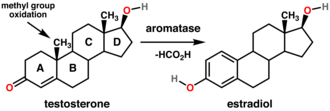Aromatization
Aromatization[edit]
Aromatization is a chemical process by which an aliphatic compound is converted into an aromatic compound. This transformation is significant in both organic chemistry and biochemistry, as it involves the formation of stable aromatic rings, which are prevalent in many natural and synthetic compounds.

Chemical Process[edit]
Aromatization typically involves the dehydrogenation of cyclic alkanes to form aromatic hydrocarbons. This process can be catalyzed by various agents, including metals and metal oxides. For example, the conversion of methylcyclohexane to toluene is a classic example of aromatization, where hydrogen atoms are removed to form the aromatic ring structure.

In the laboratory, aromatization can be achieved using specific reagents such as DDQ (2,3-dichloro-5,6-dicyano-1,4-benzoquinone), which facilitates the dehydrogenation of cyclic compounds. The DDQ aromatization rearrangement is a notable reaction in this context.
Biological Aromatization[edit]
In biological systems, aromatization is a crucial step in the biosynthesis of estrogens from androgens. The enzyme aromatase catalyzes the conversion of testosterone to estradiol, a process essential for the regulation of reproductive and other physiological functions.

Industrial Applications[edit]
Aromatization is also important in the petrochemical industry, where it is used to convert aliphatic hydrocarbons into aromatic compounds, which are valuable as chemical feedstocks and in the production of fuels. The process is often carried out in the presence of catalysts such as platinum or molybdenum on alumina supports.
Related Reactions[edit]
Several related chemical reactions involve aromatization as a key step. The Semmler-Wolff reaction is one such example, where cyclohexanones are converted to phenols.

Another example is the aromatization of tetrahydronaphthalenedione to form naphthalene derivatives, which are important in the synthesis of dyes and pharmaceuticals.

Related Pages[edit]
External Links[edit]
- [Aromatization on Wikimedia Commons](https://commons.wikimedia.org/wiki/Category:Aromatization)
Lua error: bad argument #2 to 'title.new' (unrecognized namespace name 'Portal').
Ad. Transform your life with W8MD's Budget GLP-1 injections from $75


W8MD offers a medical weight loss program to lose weight in Philadelphia. Our physician-supervised medical weight loss provides:
- Weight loss injections in NYC (generic and brand names):
- Zepbound / Mounjaro, Wegovy / Ozempic, Saxenda
- Most insurances accepted or discounted self-pay rates. We will obtain insurance prior authorizations if needed.
- Generic GLP1 weight loss injections from $75 for the starting dose.
- Also offer prescription weight loss medications including Phentermine, Qsymia, Diethylpropion, Contrave etc.
NYC weight loss doctor appointmentsNYC weight loss doctor appointments
Start your NYC weight loss journey today at our NYC medical weight loss and Philadelphia medical weight loss clinics.
- Call 718-946-5500 to lose weight in NYC or for medical weight loss in Philadelphia 215-676-2334.
- Tags:NYC medical weight loss, Philadelphia lose weight Zepbound NYC, Budget GLP1 weight loss injections, Wegovy Philadelphia, Wegovy NYC, Philadelphia medical weight loss, Brookly weight loss and Wegovy NYC
|
WikiMD's Wellness Encyclopedia |
| Let Food Be Thy Medicine Medicine Thy Food - Hippocrates |
Medical Disclaimer: WikiMD is not a substitute for professional medical advice. The information on WikiMD is provided as an information resource only, may be incorrect, outdated or misleading, and is not to be used or relied on for any diagnostic or treatment purposes. Please consult your health care provider before making any healthcare decisions or for guidance about a specific medical condition. WikiMD expressly disclaims responsibility, and shall have no liability, for any damages, loss, injury, or liability whatsoever suffered as a result of your reliance on the information contained in this site. By visiting this site you agree to the foregoing terms and conditions, which may from time to time be changed or supplemented by WikiMD. If you do not agree to the foregoing terms and conditions, you should not enter or use this site. See full disclaimer.
Credits:Most images are courtesy of Wikimedia commons, and templates, categories Wikipedia, licensed under CC BY SA or similar.
Translate this page: - East Asian
中文,
日本,
한국어,
South Asian
हिन्दी,
தமிழ்,
తెలుగు,
Urdu,
ಕನ್ನಡ,
Southeast Asian
Indonesian,
Vietnamese,
Thai,
မြန်မာဘာသာ,
বাংলা
European
español,
Deutsch,
français,
Greek,
português do Brasil,
polski,
română,
русский,
Nederlands,
norsk,
svenska,
suomi,
Italian
Middle Eastern & African
عربى,
Turkish,
Persian,
Hebrew,
Afrikaans,
isiZulu,
Kiswahili,
Other
Bulgarian,
Hungarian,
Czech,
Swedish,
മലയാളം,
मराठी,
ਪੰਜਾਬੀ,
ગુજરાતી,
Portuguese,
Ukrainian